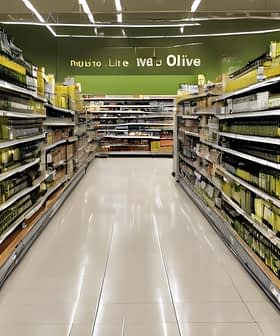A Chinese delegation of producers and other members of the olive oil sector have expressed interest in joining the International Olive Council (IOC) at talks in Madrid.
The delegation from the world’s second-most populous country and second-largest economy visited the international organization’s headquarters in Madrid in September.
Deng Yu, the director of the Longnan Olive Oil Research Center, and Robert Woo, the president of the Olive Oil Life Association, met with IOC executive director Jaime Lillo to examine the issue of accession and the recognition of more Chinese laboratories and tasting panels.
China’s per capita consumption is just 0.04 kilograms per year, highlighting its significant potential as a growing consumer market.
According to IOC deputy executive director Abderraouf Laajimi, China already has one physico-chemical laboratory for residue and contaminant testing and one IOC-recognized tasting panel.
“With the growing interest in olive oil consumption, imports and domestic production in China, it is crucial to strengthen quality control for imported and locally produced virgin olive oils,” he told Olive Oil Times.
According to the United States Department of Agriculture, China produced 8,000 metric tons of olive oil in the 2023/24 crop year. The USDA anticipates production will be about the same in the approaching 2024/25 crop year.
See Also:Spanish Producers, Policy Makers Explore Strategies for Success in Chinese MarketIOC data show that Chinese olive oil consumption has increased dramatically in the past 15 years, rising from 12,000 tons in 2008/09 to a record-high 57,500 tons in 2021/22. In a preliminary estimate for the 2023/24 crop year, which ended in September, the IOC forecasted consumption to reach 46,000 tons.
“Expanding the number of IOC-recognized laboratories and tasting panels in China would play a key role in preventing fraud, deceptive practices and adulteration,” Laajimi said. “This would safeguard consumer rights and ensure that olive oils adhere to international standards for purity and quality.”
The IOC estimates that China represents about four percent of global olive oil imports. At their meeting, Yu told Lillo that he expects olive oil consumption to increase by about seven percent annually as Chinese consumers develop an appetite for olive oil and the product reaches new audiences through marketing initiatives.
According to Yu, in the 60 years since commercial olive cultivation was introduced to China, farmers have planted 120,000 hectares of olive trees in the central Gansu and Sichuan provinces. The country boasts about 50 mills that can produce 11,000 tons of olive oil annually.
While local production is expected to climb, Laajimi indicated that the Chinese market presents an immense medium- and long-term opportunity for olive oil producers and exporters.
“China’s per capita consumption is just 0.04 kilograms per year, highlighting its significant potential as a growing consumer market,” he said. “A close relationship with the IOC could further stimulate domestic demand through targeted promotional campaigns.”
“China is one of the main importers of olive oil, with Spain as its primary supplier,” Laajimi added. “Since Spain is part of the E.U., an IOC member state, fostering a closer relationship with the IOC could help China better understand and address challenges in its domestic olive oil market.”
Indeed, Spanish producers and policymakers have been working hard in recent years to develop exports to China. According to data from Spain’s Ministry of Economy, Commerce and Business analyzed by Olive Oil Times, Spain provides China with 64 percent of its olive oil needs in 2022/23.
Among the challenges cited by Spanish producers doing business in Spain are educating consumers about olive oil’s health benefits, understanding Chinese food culture and idiosyncrasies, and targeting advertising and supply at critical moments in the year when olive oil purchases are at their highest.
Given the Chinese delegation’s expressed interest in becoming the 22nd member of the IOC, Laajimi said there is a clear path to accession.
“If China wishes to become a member of the IOC, it must submit an application, which would trigger a process where the Council of Members decides the country’s quota,” he said. “This quota, based on China’s involvement in the olive sector, impacts its financial contribution and voting rights within the IOC.”
Next, Chinese authorities must sign and ratify the International Agreement on Olive Oil and Table Olives.
“Once a member, China would enjoy the rights and obligations of membership,” Laajimi said. “Becoming an IOC member grants countries access to international standards, technical expertise, market promotion and a say in global olive oil policies.”
“In addition, China would be required to adhere to and enforce the IOC trade standard, ensuring the protection of its consumers by guaranteeing olive oil quality and authenticity in its domestic market,” he added.









